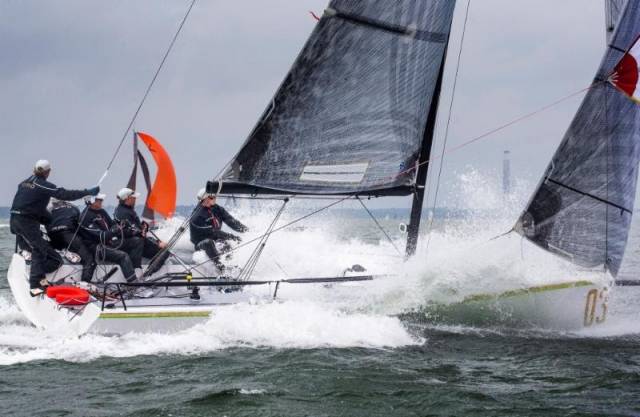Following on from last week's Irish IRC Nationals at Howth, the cream of the British IRC fleet, from both the UK and abroad, will include several brand new race boats going head to head over 24-26th June at the Royal Ocean Racing Club's IRC National Championship.
The three day long regatta will include a mix of windward-leeward and round the cans courses on the Solent to determine the 2016 IRC National Champion.
At the regatta, attention will be particularly on the two new IRC-based box rule classes making their debut this year: the Fast 40+ and the HP30.
Leading the charge will be the ten Fast 40+ yachts. This new breed is already providing some of the most competitive home-grown grand prix-level handicap keelboat racing the UK has seen since the height of the Admiral's Cup - but this time at high speed.
The class Fast 40+ made its formal debut at the RORC Easter Challenge, which was won by American William Coates' Ker 43 Outra Vez. Since then Peter Morton's Carkeek 40 Mk3 Girls on Film has claimed the Vice Admiral's Cup and appears the campaign to beat.
Making her debut in the class at the IRC Nationals is Andrew Pearce's Magnum 4 - a Ker 40+ and near sistership to Sir Keith Mills' Invictus.
Pearce is the only 'second generation' owner to date in the FAST40+ class. His highly successful Magnum III was the older version of the Ker 40, in which he won the Morgan Cup in 2012 and finished third overall in the RORC's 2013 Season's Points Championship, including being top British boat in the Rolex Fastnet Race.
Pearce is very much looking forward to taking his new speedster out at the IRC Nationals: "This is everything we didn't have when I had the last Ker 40." When he was campaigning Magnum III, the FAST40+ class was proposed, but it only gained traction last year. The new class, and the prospect of ten or more similar high performance boats competing, is what prompted Pearce to commission his latest Magnum.
Having first sailed her last weekend, Pearce says Magnum 4 is already proving lightning fast: "She does slip along beautifully. On Saturday, it was very light, but we were moving along at 5 knots in 5 knots of wind speed. On Sunday, there was 18 knots of breeze and kite up downwind, she was doing 21.5 knots. In the old boat, if we hit 18 knots we were thrilled. So first weekend out and we've already hit 20 knots with no fuss, no bother."
So early on, Pearce warns that his expectations for the IRC Nationals aren't high - he would be happy finishing in the top half of the fleet.
If the FAST40+ class was created to satisfy an appetite among owners to race fast boats, the same is also true, albeit at a lower price point, of the even newer HP30.
The HP30 is defined as having a minimum IRC Time Correction Coefficient of 1.030, must be 5-9.15m long, have a displacement length ratio (DLR) of 100 and maximum weight of 2000kg, although pre-September 2015 boats can be up to 9.7m, with a DLR of <118 and maximum weight of 2135kg. It varies from the FAST 40+ rule in that asymmetric spinnakers are compulsory and boats must be 'production', ie coming from a series of three or more, carrying a Craft Identification Number in compliance with the EU Recreational Craft Directive. This latter feature, for cost containment, aims at preventing modifications of any of a boat's major features, such as hull, rig, keel, etc.
Integral in setting up the class has been 'Boatspeed Doctor' Jochem Visser who says that it came about after lengthy discussions with the RORC Rating Office examining why small fast boats were leaving IRC: "People's attitudes are changing - they like boats that are easy to use, they like small crews, straightforward logistics, so they can park it away. Also the faster sportsboats were having a hard time under handicap racing. So the only way forward was to put them all together - not based on a size of boat, but on a type."
Having lined up for the very first time at last month's Vice Admiral's Cup, the IRC Nationals will be the HP30's second event. Competing are two Farr 280s, including Fomo, campaigned by American Lloyd Thornburg, owner of MOD 70 Phaedo. There is a Melges 32, John Reivers' Drop Bear M32, at the top end of the rating spectrum and the Farr 30, Malcolm Wootton's Pegasus, at the bottom.
Visser helps campaign Dane Thorkild Juncker's Cool Runnings, an Open 7.50 with IMOCA 60 lineage, featuring a rotating wingmast and twin rudders. Cool Runnings finished the Vice Admirals' Cup second behind Fomo.
































































